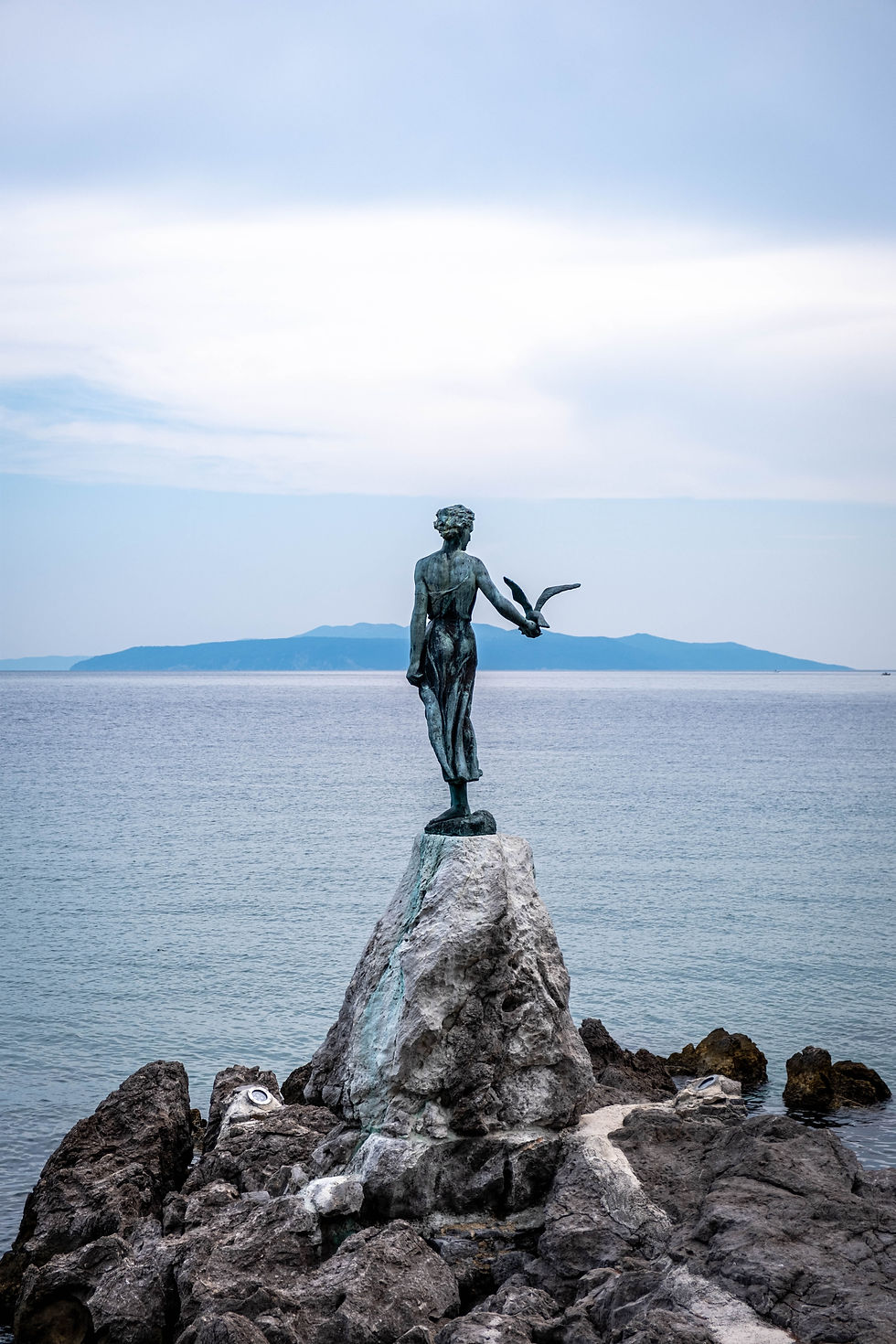Opatija: A Unique Adriatic Gem
- rebsytravels
- Aug 27, 2023
- 3 min read

We've had the privilege of visiting Croatia numerous times throughout our adult lives and Opatija was the very first place I holidayed in Croatia, nearly 20 years ago. Situated on the stunning Adriatic coast, this town stands apart from the mediaeval cities on the opposite side of the bay. Originally a fishing village, Opatija was established in the late 19th century as an Austro-Hungarian spa and retreat. It exudes a distinctive regency charm and boasts miles of riviera—a fantastic cobbled coastal path that hugs the rugged coastline, offering access to countless opportunities for swimming.
In the past two decades, tourism in the region, and indeed all across Croatia, has flourished. As a result, prices have escalated, decrepit villas have been rejuvenated, and finding an affordable room (even one with a shared bathroom) in Opatija or the neighbouring city of Rijeka was impossible within our £100-a-day budget. Additionally, Croatia's camping infrastructure is less developed and with only one campsite, Camping Opatija, catering to the entire region we opted to book ahead to secure a spot - although in hindsight, there was ample space, and turning up and pitching a tent would have been fine.
The campsite is situated in the nearby village of Ičići, a 35-minute walk or a 15-minute bus ride from Opatija. Don’t be put off by the distance to town, the walk along the Lugamore (coastal path) in and out of Opatija is a highlight of staying in the region. The site is just off the beach, providing picturesque sea-facing views. It's organised across a series of grassy levels that ascend steeply from the shore. Pitch assignments are flexible, ranging from secluded wooded spots to clear campervan spaces, many with partial sea-views. A helpful policy allows you to pitch anywhere and register the following day if you arrive after reception closes. This was a boon for us as our bus was scheduled to arrive after 9pm.

The facility offers multiple clean and spacious toilet and shower blocks, a small on-site shop, and, most importantly, abundant space. Notably, it's less than a 5-minute walk to some of the finest swimming spots imaginable. Given the prevailing accommodation costs in the region, we were pleasantly surprised that the nightly rate for a pitch plus two adults amounted to a mere 23 Euros. We were half-expecting a more substantial bill upon departure.
Given Croatia was relatively expensive, to manage costs, we prepared our own meals at the campsite, purchased beer from the supermarket, and maximised our experience of the stunning coastline, which offered numerous opportunities for swimming. Those familiar with Croatia will appreciate the unparalleled clarity and beauty of its waters. However, in certain areas, particularly around larger cities like Split, finding a suitable spot for a swim can be a bit of a quest. Opatija, however, boasts a literal expanse of coastal swimming perfection—an extended stretch of coastline that feels like a boundless aquatic playground. Even just a few metres apart, you'll find man-made platforms integrated into the rocky shoreline, tempting you back into the embrace of the water. The temperature of the water is refreshingly cool but not overly so, and its placid nature makes it ideal for early morning and dusk swims, a serene way to bookend your day. The enchanting Lugamore, a coastal path, winds its way for 12 kilometres from Lovran to Volosko, offering ample opportunities for days filled with walking and aquatic adventures.

For the intrepid traveller or those willing to temporarily part ways with the sea, hiking trails ascend directly from the coast, providing access to the 45-kilometre-long Opatija Mountain Trail. However, with our legs still recovering from Konigssee and the temperature rising, we found solace in the cooling embrace of the water.
We really didn’t want to leave!
Getting there and away.
Whilst Opatija is less connected to the European hubs than the cities of Rijeka, Zadar and Split there is a daily Flix Bus connection from Salzburg transferring in Ljubljana that arrives in Opatija just after 9pm. Of interest we were also considering connections from Munich but these were almost double the price at 70 Euro per person so it was much more affordable for us to travel to Salzburg (1hr 45 min from Munich) on the Deutsche Bahn-Ticket and then get the bus from there.
Having explored multiple routes to travel overland to Athens to catch our ferry towards Turkey, we settled on Skopje > Thessaloniki > Athens. Our next bus would be a 15 hour journey from Rijeka to Skopje. It was quite a challenge to find online retailers for the two travel companies that offer this route but in the end we were able to book ourselves on the Hafet Tours 1430 from Rijeka to Skopje using GetByBus.com.




Comentários